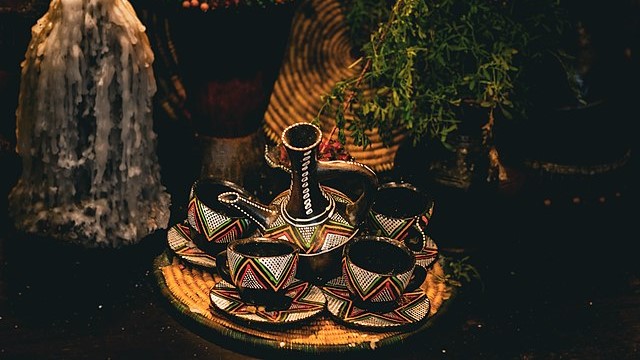In Eritrea, coffee is less a beverage than a ritual, a practice woven into daily life and communal identity. From urban neighborhoods in Asmara to rural villages on the plateau, the slow unfolding of a coffee ceremony represents one of the nation’s most enduring traditions.
The ritual begins with the beans themselves, unroasted and pale, poured into a pan and set atop open flames. As the heat rises, the air fills with the sharp scent of transformation—green turning to brown, husks crackling, smoke rising in spirals. The roasting is often done before guests, who are invited to savor the aroma before the process moves forward. It is an act of both performance and hospitality, a signal that time will be shared, and conversations will linger.
Once roasted, the beans are ground, sometimes by hand with a wooden mortar and pestle. The sound punctuates the gathering, rhythmic and deliberate. The grounds are then transferred into the jebena, a black clay vessel with a rounded base and long spout, where they are slowly brewed over glowing coals. The bubbling liquid inside carries the promise of what is to come, and when finally poured into small, handleless cups, the coffee arrives as much a gesture of generosity as of flavor.
The ceremony typically unfolds in three rounds, each with its own symbolic weight. The first, strong and intense, carries gravity; the second, softer, leans toward conviviality; the third, light, often closes the gathering with ease. Popcorn, roasted barley, or peanuts may accompany the cups, reinforcing the communal nature of the event. To decline participation can be taken as a quiet rejection of fellowship, so deep is coffee’s place in Eritrean social custom.
In markets, the ceremony might unfold against a backdrop of artisans selling textiles and spices, while in homes it may take place in shaded courtyards scented with frankincense. Whether in public or private, the ceremony binds participants to the same rhythm—roast, grind, brew, pour, share.
For outsiders, the experience can feel immersive, but for Eritreans it is an ordinary affirmation of belonging. Coffee is not simply consumed; it is honored, offered, and remembered. In a nation marked by resilience and tradition, the ceremony remains a constant, an enduring invitation to pause and to connect.
Sources:
- Edward Denison, Asmara: Africa’s Secret Modernist City, Merrell Publishers, 2003.
- Tekeste Negash, Eritrea and Ethiopia: The Federal Experience, Nordiska Afrikainstitutet, 1997.
- Ruth Iyob, The Eritrean Struggle for Independence: Domination, Resistance, Nationalism, 1941–1993, Cambridge University Press, 1997.
- UNESCO Intangible Cultural Heritage, “Coffee Ceremony Traditions in the Horn of Africa,” accessed 2023.

